新概念英语第一册56课讲义
- 格式:ppt
- 大小:2.83 MB
- 文档页数:47
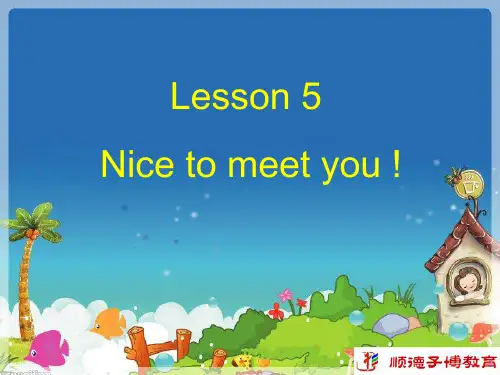
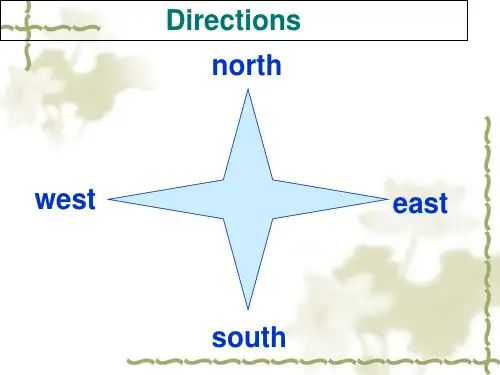



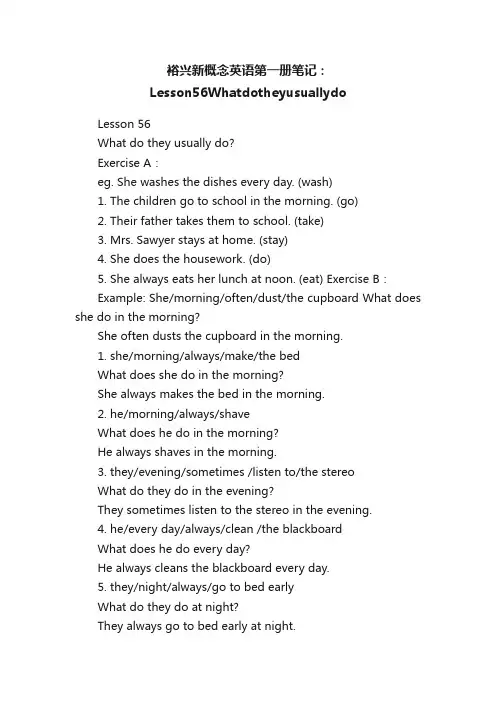
裕兴新概念英语第一册笔记:Lesson56WhatdotheyusuallydoLesson 56What do they usually do?Exercise A:eg. She washes the dishes every day. (wash)1. The children go to school in the morning. (go)2. Their father takes them to school. (take)3. Mrs. Sawyer stays at home. (stay)4. She does the housework. (do)5. She always eats her lunch at noon. (eat) Exercise B:Example: She/morning/often/dust/the cupboard What does she do in the morning?She often dusts the cupboard in the morning.1. she/morning/always/make/the bedWhat does she do in the morning?She always makes the bed in the morning.2. he/morning/always/shaveWhat does he do in the morning?He always shaves in the morning.3. they/evening/sometimes /listen to/the stereoWhat do they do in the evening?They sometimes listen to the stereo in the evening.4. he/every day/always/clean /the blackboardWhat does he do every day?He always cleans the blackboard every day.5. they/night/always/go to bed earlyWhat do they do at night?They always go to bed early at night.6. she/every day/usually/wash /the dishesWhat does she do every day?She usually washes the dishes every day.7. they/afternoon/usually/type/some lettersWhat do they do in the afternoon?They usually type some letters in the afternoon.8. it/every day/usually/think /some milkWhat does it do every day?It usually drinks some milk every day.9. they/evening/sometimes/watch /televisionWhat do they do in the evening?They sometimes watch television in the evening.10.she/noon/always/cat/her lunchWhat does she do at noon?She always cats her lunch at noon.11.he/evening/often/read/his newspaperWhat does he do in the evening?He often reads his newspaper in the evening.小结:一般现在时一般现在时用于表示一个习惯动作,有规律的行为以及永恒的现象。
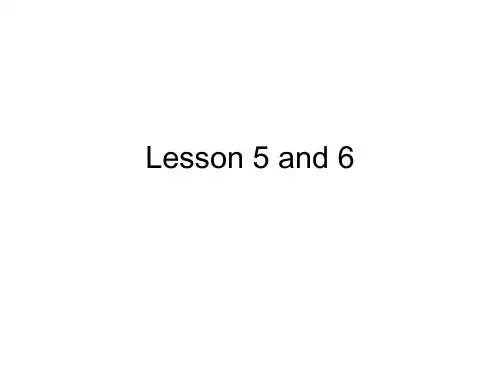
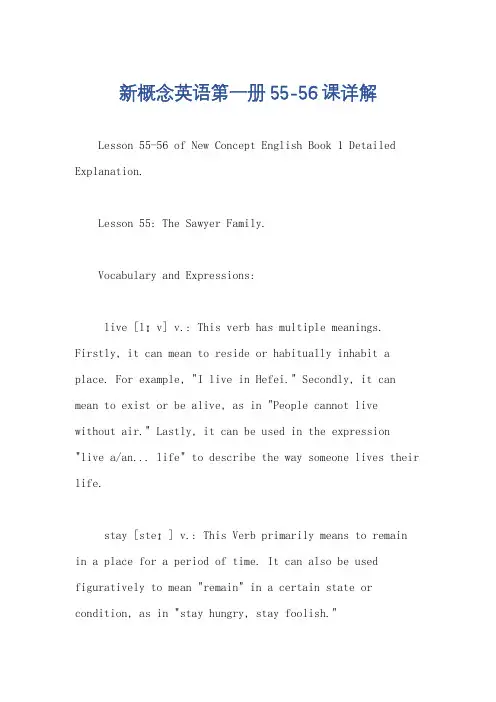
新概念英语第一册55-56课详解Lesson 55-56 of New Concept English Book 1 Detailed Explanation.Lesson 55: The Sawyer Family.Vocabulary and Expressions:live [lɪv] v.: This verb has multiple meanings. Firstly, it can mean to reside or habitually inhabit a place. For example, "I live in Hefei." Secondly, it can mean to exist or be alive, as in "People cannot live without air." Lastly, it can be used in the expression "live a/an... life" to describe the way someone lives their life.stay [steɪ] v.: This Verb primarily means to remain in a place for a period of time. It can also be used figuratively to mean "remain" in a certain state or condition, as in "stay hungry, stay foolish."home [həʊm] n./adv.: As a noun, it refers to the place where one lives. As an adverb, it means "to the place where one lives," as in "go home."housework ['haʊswɜːk] n.: This noun refers to the tasks related to maintaining a household, such as cleaning, cooking, and laundry.lunch [lʌnʃ] n.: This noun refers to the meal eaten in the middle of the day.afternoon [ɑːftə'nuːn] n.: This noun refers to the period of time between noon and evening.Text Explanation:Lesson 55 introduces the Sawyer family and their daily routine. The lesson begins by introducing the family members and their occupations. Mr. Sawyer works in an office, while Mrs. Sawyer stays at home. The children go to school. The lesson then goes on to describe their eveningactivities. Mr. Sawyer usually arrives home from work at about five o'clock, and the family then has their lunch together. In the afternoon, they often have a rest, andthen in the evening, they usually stay at home and watch television.Grammar Points:The use of "-s" or "-es" to form the third-person singular present tense of verbs is reinforced in this lesson. For example, "Mr. Sawyer usually arrives home from work at about five o'clock."The use of prepositions with "live" is also introduced. For example, "Mr. Sawyer lives in a town near London,"where "in" is used with a large place, and "Mrs. Sawyerlives at 87 King Street," where "at" is used with aspecific address.Lesson 56: What Do They Do?Vocabulary and Expressions:together [tə'geðə] adv.: This adverb means "in a group" or "side by side."evening ['iːvnɪŋ] n.: This noun refers to the time of day that comes after afternoon and before night.arrive [ə'raɪv] v.: This Verb means to reach a destination after a journey.night [naɪt] n.: This noun refers to the period of time from sunset to sunrise.Text Explanation:Lesson 56 continues the theme of the Sawyer family's daily life by asking the question, "What do they do?" The lesson provides information about the family's evening activities. Mr. Sawyer usually arrives home from work at about five o'clock, and then the family has their tea together. After tea, they usually sit in the living room and watch television. Sometimes, they go to the cinema orto the theater. On Sundays, they often go for a walk in the park.Grammar Points:The present tense of verbs is reinforced in this lesson, particularly the use of the third-person singular form.The lesson also introduces the use of modal verbs such as "can" and "usually" to express ability and frequency.Conclusion:Lessons 55 and 56 of New Concept English Book 1 focus on the Sawyer family's daily routine and activities. These lessons introduce new vocabulary and expressions related to family life, daily activities, and grammar points such as the use of "-s" or "-es" in the third-person singular present tense and the use of modal verbs. By learning these lessons, students can improve their understanding of family life in English-speaking countries and enhance theirlanguage skills in areas such as vocabulary, grammar, and comprehension.。



新概念第一册精讲第56课:索耶一家人 The SawyerfamilyLesson 561 The children go to school in the morning.2 Their father takes them to school.3 Mrs. Sawyer stays at home.4 She does the housework.5 She always eats her lunch at noon.1 What does she do in the morning?She always makes the bed in the morning.2 What does he do in the morning?He always shaves in the morning.3 What do they do in the evening?They sometimes listen to the stereo2 in the evening.4 What does he do every day?He always cleans the blackboard every day.5 What do they do at night?They always go to bed early at night.6 What does she do every day?She usually washes the dishes every day.7 What do they do in the afternoon?They usually type some letters in the afternoon.8 What does it do every day?It usually drinks some milk every day.9 What do they do in the evening?They sometimes watch television in the evening.10 What does she do at noon?She always eats her lunch at noon.11 What does he do in the evening?He often reads his newspaper in the evening.课堂笔记Lesson 55 The Sawyer family新单词:live、stay、home、housework、lunch、afternoon、usually、together、evening、arrive、nightlive:长期居住在…;短期住dwell3:合法居住inhabit:世世代代居住在…reside:(正式用语)居住在…live in/live atMy uncle lives in Paris.The Sawyers live at 87 King Street.Where do they live?/ Where does she(he) live?Live (a.) live show:现场演出make a live:谋生live for:为……而活者homeless:无家可归homesick4:思乡的hometown:家乡homely5:家常的homeland:祖国homemade:自制的home alone:独自在家(小鬼当家)地点副词:here,there,home,upstairs,downstairs,downtown,abroad这些地点副词前面不能加介词do one's houseworkdo the houseworkbreakfast:早餐lunch:午餐supper:晚餐dinner:正餐,宴会meal:一顿饭 three meals a dayin the afternoonin the eveningat nightarrive in/atgo to work:去上班go to school:去上学take sb. to somewhere:带某人去……see one's friends:拜访……的朋友drink tea together:一起喝茶come home from school:从学校回家come home from work:下班回家arrive home:到家live at, go to work, go to school, take to, stay at home, do the housework, eat one's lunch, see one's friends, drink tea togher, come home from school, arrive home, come home from work, do one's homework, go to bed, read one's paper, wathe TVThe Sawyers live at 87 King Street.In the morning, Mr. Sawyer goes to work and the children go to school.Their father takes them to school every day.Mrs. Sawyer stays at home every day.She does the housework.She always eats her lunch at noon.In the afternoon, she always sees her friends.They often drink tea together.In the evening, the children come home from school.They arrive home early.Mrs. Sawyer comes home from work.He arrives home late.At night, the children always do their homework.Then go to bed.Mr. Sawyer usually reads his newspaper, but sometimes he and his wife watch television.by――表示某种方式by car/bus/trainThey go to school by car every day.They are going to school by bus today.on footThe children are going to school on foot.at+时间The children come home from school at 5 every day.。
Lesson 5 Nice to meet you!Lesson6 What make is it?Keywords:1.★Mr. 先生加在男性的姓氏前面Mrs. 夫人(已婚的)(随夫姓)Ms. 女士(不表明婚姻状况)Mr. / Mrs. / Miss后面只能加姓或者全名,不能直接加名字。
John Blake,可以称呼为Mr. Blake或Mr. John Blake,但是不能说Mr. John。
2.★ makeV 制造,做He is making a cake.N. (产品的)牌子,型号,类型What make is it?3.★国名和某国人(详细见后表)China – Chinese America – American England – English4.★ This is Miss Sophie Dupont.This is …… 这是……介绍物品或者人注意:介绍人是有顺序的,一般是先年长后年轻,先上级后下级,先女士后男士。
外国人的姓名一般有三个部分: First name + Middle name + Last nameGiven name + Middle name + Family name对照:中国人是姓在前名在后,外国人是名在前姓在后。
5. Nice to meet you.用于初次相识或被人介绍时打招呼回答:Nice to meet you, too. 也可以说Me, too.类似的表达,例如Glad/happy/pleased to meet/see you.正式的说法是:-How do you do? -How do you do?6. Sophie is a new student.冠词a/an用在单数可数名词之前,表泛指,尤其是第一次出现时。
a 用于元音因素前,an 用于辅音因素前。
注意的字母:h/u 词:an hour a house an umbrella a university语法1.★冠词: 定冠词和不定冠词a,an是不定冠词,一个(1)a/an有不确定的意义(即所说的人、动物或东西对听者或读者来说可能是不知道的)。
Lesson 56A1 The children go to school in the morning.2 Their father takes them to school.3 Mrs. Sawyer stays at home.4 She does the housework.5 She always eats her lunch at noon.B1 What does she do in the morning?She always makes the bed in the morning.2 What does he do in the morning?He always shaves in the morning.3 What do they do in the evening?They sometimes listen to the stereo2 in the evening.4 What does he do every day?He always cleans the blackboard every day.5 What do they do at night?They always go to bed early at night.6 What does she do every day?She usually washes the dishes every day.7 What do they do in the afternoon?They usually type some letters in the afternoon.8 What does it do every day?It usually drinks some milk every day.9 What do they do in the evening?They sometimes watch television in the evening.10 What does she do at noon?She always eats her lunch at noon.11 What does he do in the evening?He often reads his newspaper in the evening.课堂笔记Lesson 55 The Sawyer family新单词:live、stay、home、housework、lunch、afternoon、usually、together、evening、arrive、night live:长期居住在…;短期住dwell3:合法居住inhabit:世世代代居住在…reside:(正式⽤语)居住在…live in/live atMy uncle lives in Paris.The Sawyers live at 87 King Street.Where do they live?/ Where does she(he) live?Live (a.) live show:现场演出make a live:谋⽣live for:为……⽽活者homeless:⽆家可归homesick4:思乡的hometown:家乡homely5:家常的homeland:祖国homemade:⾃制的home alone:独⾃在家(⼩⿁当家)地点副词:here,there,home,upstairs,downstairs,downtown,abroad这些地点副词前⾯不能加介词do one's houseworkdo the houseworkbreakfast:早餐lunch:午餐supper:晚餐dinner:正餐,宴会meal:⼀顿饭 three meals a dayin the afternoonin the eveningat nightarrive in/atgo to work:去上班go to school:去上学take sb. to somewhere:带某⼈去……see one's friends:拜访……的朋友drink tea together:⼀起喝茶come home from school:从学校回家come home from work:下班回家arrive home:到家live at, go to work, go to school, take to, stay at home, do the housework, eat one's lunch, see one's friends, drink tea togher, come home from school, arrive home, come home from work, do one's homework, go to bed, read one's paper, wathe TV The Sawyers live at 87 King Street.In the morning, Mr. Sawyer goes to work and the children go to school.Their father takes them to school every day.Mrs. Sawyer stays at home every day.She does the housework.She always eats her lunch at noon.In the afternoon, she always sees her friends.They often drink tea together.In the evening, the children come home from school.They arrive home early.Mrs. Sawyer comes home from work.He arrives home late.At night, the children always do their homework.Then go to bed.Mr. Sawyer usually reads his newspaper, but sometimes he and his wife watch television.by――表⽰某种⽅式by car/bus/trainThey go to school by car every day.They are going to school by bus today.on footThe children are going to school on foot.at+时间The children come home from school at 5 every day.。